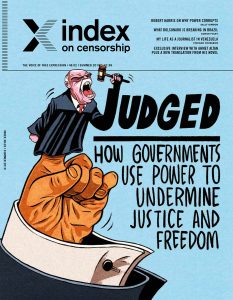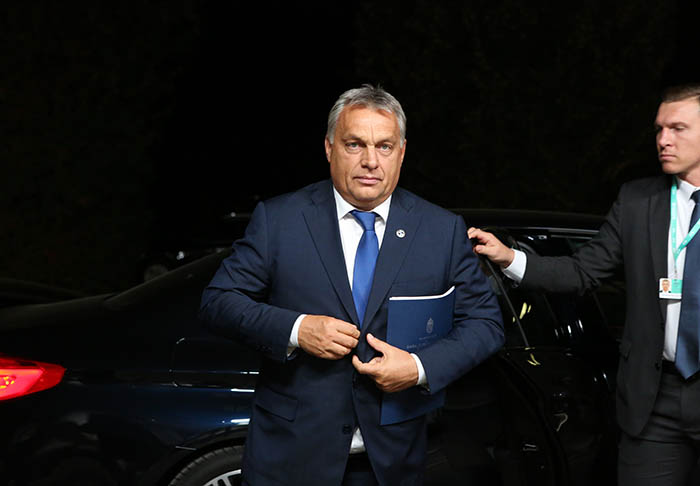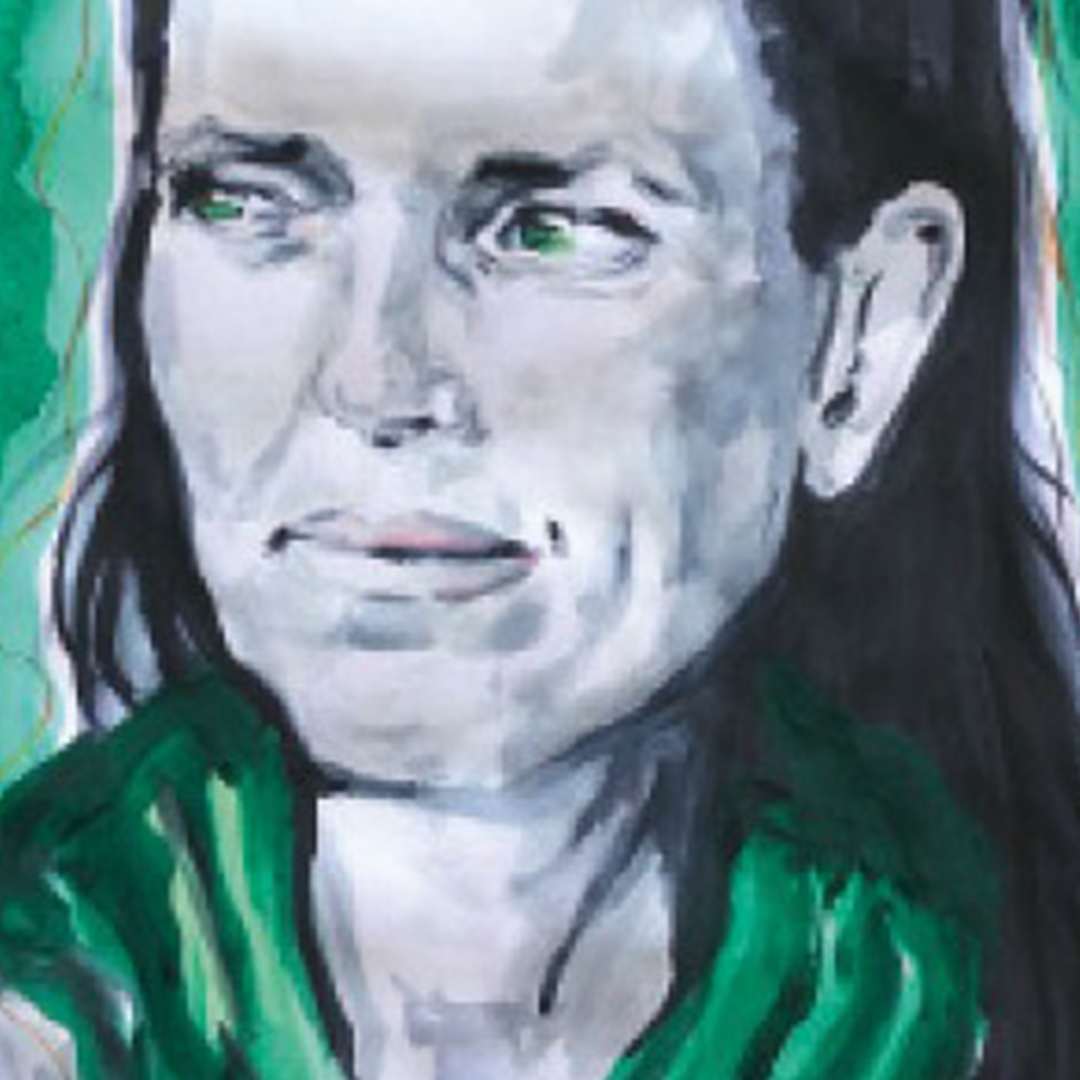24 Jun 2019 | China, News, United Kingdom, United States, Venezuela, Volume 48.02 Summer 2019, Volume 48.02 Summer 2019 Extras
In the Index on Censorship summer 2019 podcast, we focus on how governments use power to undermine justice and freedom. Lewis Jennings and Rachael Jolley discuss the latest issue of the magazine, revealing their top picks and debating what rating they would be under China’s social credit rating system. Guests include best-selling Chinese author Xinran, who delves into surveillance in China; Italian journalist Stefano Pozzebon, who reveals the dangers of being a foreign journalist in Venezuela; and Steve Levitsky, the co-author of The New York Times best-seller How Democracies Die, discusses political polarisation in the US.
Print copies of the magazine are available on Amazon, or you can take out a digital subscription via Exact Editions. Copies are also available at the BFI, the Serpetine Gallery and MagCulture (all London), News from Nowhere (Liverpool). Red Lion Books (Colchester) and Home (Manchester). Each magazine sale helps Index on Censorship continue its fight for free expression worldwide.
The Summer 2019 podcast can also be found on iTunes.
19 Jun 2019 | Press Releases

Judged: How governments use power to undermine justice and freedom. The summer 2019 edition of Index on Censorship magazine
In a world when journalists are operating in increasingly harsh and difficult conditions, and are hit by lawsuits to stop them doing that, they need lawyers independent enough to stand up with them in court. This is an issue that the latest edition of Index on Censorship magazine looks at in detail.
“While at a conference, I spoke to journalists under extreme pressure. They told me: ‘When the independence of the justice system is gone then that is it. It’s all over.” We need to make a wider public argument about the importance of the judiciary. It’s something we should all be talking about in the local cafe. The average citizen needs to be vigilant to make sure the line between those making the laws and those sitting in judgement is not blurred. Our fundamental rights depend on it,” Rachael Jolley, editor of Index on Censorship, said.
In the latest magazine we look at a global phenomena where powerful governments are trying to unpick the independence of legal systems, to bring them under more direct influence, and the implications for global freedom of expression and freedom of the media.
With contributions from Kaya Genc in Turkey; Stephen Woodman on the Mexican government’s promises to rebuild the pillars of democracy and what hasn’t happen; Jan Fox on Donald Trump’s trampling of democratic norms; Karoline Kan on China’s retaliation against lawyers who argue for human rights, Caroline Muscat on independent news in Malta, Melanio Escobar and Stefano Pozzeban on Venezuela’s abuse of judicial power, Viktoria Serdult on how the Hungarian prime minister is pressurising independence in all its forms, Silvia Nortes on the power of the Catholic church in increasingly secular Spain.
In China, hundreds of human rights lawyers are in prison; in England and Wales, it has become more of a financial risk for ordinary people to go to court; in Brazil, the new president has appointed a judge who was very much part of the election campaign to a super-ministerial role. In Turkey, the Erdogan government is challenging the opposition candidate’s win in Istanbul’s mayoral elections. Hungary’s Orban has been set out plans to introduce new types of courts under the nose of the EU (although there appears to have been a U-turn).
We have an exclusive interview with imprisoned author and journalist Ahmet Altan, who was accused of inserting subliminal messages in support of the attempted July 2016 coup into a television broadcast and was sentenced to life in prison, told us: “I came out against the unlawful practices of both the era of military tutelage and that of the AKP [the ruling Justice and Development Party]: I believe I am a target of their anger.” The issue also includes the first English translation of an extract from his 2005 novel The Longest Night.
“Ahmet’s case is a perfect illustration of what can happen when the rule of law and courts are aligned with the political will of an increasingly authoritarian government,” Jolley commented.
About Index on Censorship Magazine
Since its establishment in 1972, Index on Censorship magazine has published some of the greatest names in literature including Samuel Beckett, Nadine Gordimer, Mario Vargas Llosa, Hilary Mantel and Kurt Vonnegut. It also has published some of the greatest campaigning writers of our age from Vaclav Havel to Amartya Sen and Ariel Dorfman plus journalism from Mexico, Argentina, South Africa, China, India, Turkey and more. Editor Rachael Jolley was named British Society of Editors’ editor of the year in the specialist publication category (2016) and the magazine has received numerous awards including the APEX Award for Excellence and the Hermann Kesten prize.
With each new issue of the magazine, an archival issue will become available for students, researchers and supporters of free expression. The four latest issues of the magazine are available for purchase in print or digital formats via SAGE Publishing, bookshops and Exact Editions.
Subscription information
Annual digital subscription (four issues) £18
A complete digital replica of the magazine
Annual print subscription (four issues) £35
Four high-quality print editions delivered to your door
Available at these bookshops
BFI, Serpentine Gallery and MagCulture (London), News from Nowhere (Liverpool), Home (Manchester) and Red Lion Books (Colchester).
Apps
- iPad/iPhone £1.49 (USD $2.90) per issue
- Buy one or more issues. Download the preview app (21 pages of latest issue for free), free upgrade the preview app to a 30-day subscription.
- Android tablets/phones
- Download the Exactly app from the Google Play store. A one-year subscription is £17.99 | $17.99
- Kindle Fire
- Download the Exactly app from Amazon. A one-year subscription is £17.99 | $17.99
19 Jun 2019 | Magazine, Magazine Editions, Volume 48.02 Summer 2019
Writer
Xinran is a best-selling British-Chinese author and advocate for women’s issues. She was the first woman to host a phone-in program called ‘Words on the Night Breeze’ from 1989 to 1997.
Novelist
Claudia Piñeiro is a best-selling Argentinian novelist and screenwriter. In 1992 she won the prestigious Pléyade journalism award. Her books have been translated into four different languages.
Author
Robert Harris is a best-selling English novelist. He is a former BBC television reporter. Though he began his career in non-fiction, he has found success through his historical fiction.
18 Apr 2019 | Magazine, News, Volume 48.01 Spring 2019
[vc_row][vc_column][vc_custom_heading text=”Responding to violations of media freedom in Hungary has become a conundrum for the EU. With populist parties poised for large gains in the next European election, Sally Gimson explores in the spring 2019 issue of Index on Censorship magazine what the EU could do to uphold free speech in member countries” google_fonts=”font_family:Libre%20Baskerville%3Aregular%2Citalic%2C700|font_style:400%20italic%3A400%3Aitalic”][vc_column_text]

Hungarian prime minister Viktor Orbán. Credit: EU2017EE Estonian Presidency / Flickr
Dutch MEP Judith Sargentini is enemy number one in the eyes of the Hungarian government. The Green politician incurred that government’s anger when she persuaded the European Parliament to the country losing voting rights.
She accused Hungary, among other democratic failings, of not ensuring a free and uncensored press. But since the vote last September, nothing has happened, except that the Hungarian government launched a campaign against her on state television – and she no longer feels safe to travel there.
“[The government] has been spreading so much hate against me, and if the government is spreading hate, what if there is a lunatic around? I’m not taking the risk,” she said.
“The Hungarian government spent 18 million euros on a publicity campaign against me, after I won the vote – with TV commercials and a full-page advertisement with my face on it.” The other vocal critic of Hungary, Belgian Liberal MEP and former Belgian prime minister Guy Verhofstadt, as well as the philanthropist George Soros were targeted in the same campaign.
With the European elections coming up in May 2019, and the possibility of large gains by nationalist, populist parties, the question is what the EU can do to curb freedom of expression violations on its territory.
The problem according to Lutz Kinkel, managing director of the European Centre for Press and Media Freedom, is the EU has no specific competences over media freedom. No country can join the EU without guaranteeing freedom of expression as a basic human right under Article 49 of the Lisbon Treaty. Article 7 is triggered when there is “a clear risk” of a member state breaching EU values. Although this can lead to a country’s voting rights being taken away, to get to that point, all the other EU countries have to agree.
As Camino Mortera-Martinez, a senior research fellow at the think-tank Centre for European Reform in Brussels, said: “Article 7 is never going to work because it is so vague. [All the other] member states are never going to argue to punish another one by suspending voting rights.”
Historian Tim Snyder, author of The Road to Unfreedom, a book about how Russia works to spread disinformation within the West, told Index he thought Hungary should have been thrown out of the EU a long time ago. But, with Britain’s exit from the EU, it is difficult to start expelling countries now.
“The tricky thing about the European Union, and this goes not just for eastern Europe but everyone, is that there might be rules for how you get in, but once you are in the rules are a lot less clear,” he said.
[/vc_column_text][vc_row_inner][vc_column_inner width=”1/4″][vc_icon icon_fontawesome=”fa fa-quote-left” color=”custom” size=”xl” align=”right” custom_color=”#dd3333″][/vc_column_inner][vc_column_inner width=”3/4″][vc_custom_heading text=”It’s like joining a sorority with very strict rules for entering, but when you are there you can misbehave and it is covered up by the group” font_container=”tag:h3|text_align:left” google_fonts=”font_family:Libre%20Baskerville%3Aregular%2Citalic%2C700|font_style:400%20italic%3A400%3Aitalic”][/vc_column_inner][/vc_row_inner][vc_column_text]
[/vc_column_text][vc_column_text]
Hungary is the most prominent country in Europe to put restrictions on media freedom. Not only is public service media directly under government control, and critical journalists have been fired, but the government has also made sure that private media has either been driven out of business or taken over by a few oligarchs close to Prime Minister Viktor Orbán. The only independent media are very small operations, publishing almost exclusively on the internet.
Snyder told Index: “I think Europeans generally made the mistake of thinking that it doesn’t matter if we have one small country which is going the wrong way [and that] Hungary can’t possibly affect others. But the truth is – because it is easier to build authoritarianism than democracy – one bad example does ripple outwards and Hungary isn’t just Hungary and Orbán isn’t just Orbán; they represent a kind of mode of doing things which other people can look to, and individual leaders can say: ‘That’s possible’.”
This is borne out by Index on Censorship’s Mapping Media Freedom project which tracked media freedom in 43 European countries and found patterns that showed countries following Hungary’s example including Poland.
Anita Kőműves is an investigative journalist in Hungary who works for non-profit investigative outlet Átlátszó.hu which won an Index award for digital activism in 2015. She says not only does Brussels do nothing to challenge Hungary’s undermining of the free press but people in the commission are persuaded it is not all that bad.
She said: “Orbán is walking a fine line with Brussels. He knows that he cannot go too far. Whatever happens here, it must be deniable and explainable. Orbán goes to Brussels, or sends one of his henchmen, and he explains everything away. He has bad things written about him every single day in Hungary and nobody is in jail, so everything is fine… everything is not fine. Freedom of speech, the fact that I can write anything I like on the internet and nobody puts me in jail, is not the same as freedom of media when you have a strong media sector which is independent of the government.”
[/vc_column_text][/vc_column][/vc_row][vc_row][vc_column width=”1/4″][vc_icon icon_fontawesome=”fa fa-quote-left” color=”custom” size=”xl” align=”right” custom_color=”#dd3333″][/vc_column][vc_column width=”3/4″][vc_custom_heading text=”I think Europeans generally made the mistake of thinking that it doesn’t matter if we have one small country which is going the wrong way” font_container=”tag:h3|text_align:left” google_fonts=”font_family:Libre%20Baskerville%3Aregular%2Citalic%2C700|font_style:400%20italic%3A400%3Aitalic”][/vc_column][/vc_row][vc_row][vc_column][vc_column_text]
The solution for Brussels, she argues, is not Article 7 but for the EU to use European competition law to challenge the monopoly on media ownership the government and government-backed companies have in Hungary.
Kinkel says that this would be a warning to other countries, such as Bulgaria and Romania, which are trying to control the media in similar ways and in the case of Bulgaria giving EU funds only to government-friendly media.
“Governments try to get hold of public service media: this is one step,” he said. “And the other step is to throw out investors and media they don’t like and to give media outlets to oligarchs who are government-friendly and so on and so on, and to start new campaigns against independent investigative journalists.”
In Poland, the European Commission invoked Article 7 because of the government’s threats to the independence of the judiciary. The government so far controls only the state media but, as journalist Bartosz Wieliński , head of foreign news at the Gazeta Wyborcza newspaper, points out, the government used that state media to hound the mayor of Gdańsk, Paweł Adamowicz, for months before he was assassinated in January this year.
Wieliński believes it was only after Britain voted to leave the EU that countries realised they would face little sanction if they chipped away at freedom of expression. Although the EU did not collapse as they expected, the initial disarray gave them an opportunity to test European mechanisms and find them wanting.
Maria Dahle is chief executive of the international Human Rights House Foundation. She believes financial sanctions could be the way to stop countries from crossing the line, as Poland and Hungary have.
“When allocating funding, it should be conditional,” she said. “If [member states] do violate the rule of law, it has to have consequences … and the consequences should be around financial support.”
But Mortera-Martinez warns if the EU starts punishing countries too much financially, it will encourage anti-EU feeling which could be counter-productive, leading to election wins for populist, nationalist parties. The effect of any populist gains in the May elections concerns Kinkel, also: “What is clear is that when the populist faction grows, they have the right to have their people on certain positions on committees and so on. And this will be a problem… especially for press and media freedom,” he said.
Back at the European Parliament, Sargentini is impatient. “It’s about political will, and the EU doesn’t have it at the moment,” she said. “It’s like joining a sorority [with] very strict rules for entering, but when you are there you can misbehave and it’s covered up by the group.”
[/vc_column_text][/vc_column][/vc_row][vc_row][vc_column][vc_column_text]
Sally Gimson is the deputy editor of Index on Censorship magazine.
Index on Censorship’s spring 2019 issue is entitled Is this all the local news? What happens if local journalism no longer holds power to account?
Look out for the new edition in bookshops, and don’t miss our Index on Censorship podcast, with special guests, on Soundcloud.
[/vc_column_text][/vc_column][/vc_row][vc_row][vc_column width=”1/3″][vc_custom_heading text=”Is this all the local news?” font_container=”tag:h3|text_align:left” link=”url:https%3A%2F%2Fwww.indexoncensorship.org%2F2018%2F12%2Fbirth-marriage-death%2F|||”][vc_column_text]The spring 2019 issue of Index on Censorship magazine asks Is this all the local news? What happens if local journalism no longer holds power to account?
With: Libby Purves, Julie Posetti and Mark Frary[/vc_column_text][/vc_column][vc_column width=”1/3″][vc_row_inner][vc_column_inner][vc_single_image image=”105481″ img_size=”full” onclick=”custom_link” link=”https://www.indexoncensorship.org/2018/12/birth-marriage-death/”][/vc_column_inner][/vc_row_inner][/vc_column][vc_column width=”1/3″][vc_custom_heading text=”Subscribe” font_container=”tag:h3|text_align:left”][vc_row_inner][vc_column_inner][vc_column_text]In print, online. In your mailbox, on your iPad.
Subscription options from £18 or just £1.49 in the App Store for a digital issue.
Every subscriber helps support Index on Censorship’s projects around the world.
 SUBSCRIBE NOW[/vc_column_text][/vc_column_inner][/vc_row_inner][/vc_column][/vc_row][vc_row][vc_column][vc_column_text]This article has been updated on 18 April 2019 to reflect that the name of organisation Lutz Kinkel works for had been written incorrectly. The article read “European Centre for Press and Media Reform”, when it should have read “European Centre for Press and Media Freedom”.[/vc_column_text][/vc_column][/vc_row]
SUBSCRIBE NOW[/vc_column_text][/vc_column_inner][/vc_row_inner][/vc_column][/vc_row][vc_row][vc_column][vc_column_text]This article has been updated on 18 April 2019 to reflect that the name of organisation Lutz Kinkel works for had been written incorrectly. The article read “European Centre for Press and Media Reform”, when it should have read “European Centre for Press and Media Freedom”.[/vc_column_text][/vc_column][/vc_row]





